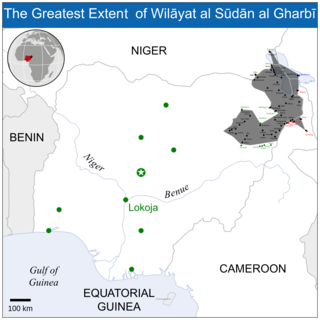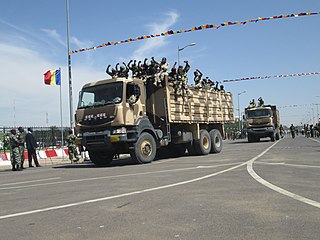
Boko Haram, officially known as Jamā'at Ahl as-Sunnah lid-Da'wah wa'l-Jihād, is an Islamist terrorist jihadist organization based in northeastern Nigeria, which is also active in Chad, Niger, northern Cameroon, and Mali. In 2016, the group split, resulting in the emergence of a hostile faction known as the Islamic State's West Africa Province.

The Boko Haram insurgency began in July 2009, when the militant Islamist and jihadist rebel group Boko Haram started an armed rebellion against the government of Nigeria. The conflict is taking place within the context of long-standing issues of religious violence between Nigeria's Muslim and Christian communities, and the insurgents' ultimate aim is to establish an Islamic state in the region.

Abu Mohammed Abubakar al-Sheikawi was a Nigerian militant who was the leader of Boko Haram, an Islamist extremist organization based in northeastern Nigeria, from 2009 to 2021. He served as deputy leader to the group's founder, Mohammed Yusuf, until Yusuf's execution in 2009.
Timeline of the Boko Haram insurgency is the chronology of the Boko Haram insurgency, an ongoing armed conflict between Nigerian Islamist group Boko Haram and the Nigerian government. Boko Haram have carried out many attacks against the military, police and civilians since 2009, mostly in Nigeria. The low-intensity conflict is centred on Borno State. It peaked in the mid-2010s, when Boko Haram extended their insurgency into Cameroon, Chad and Niger.

The Sambisa Forest is a forest in Borno State, northeast Nigeria. It is in the southwestern part of Chad Basin National Park, about 60 km southeast of Maiduguri, the capital of Borno State. It has an area of 518 km2.

Religious violence in Nigeria refers to Christian-Muslim strife in modern Nigeria, which can be traced back to 1953. Today, religious violence in Nigeria is dominated by the Boko Haram insurgency, which aims to establish an Islamic state in Nigeria. Since the turn of the 21st century, 62,000 Nigerian Christians have been killed by the terrorist group Boko Haram, Fulani herdsmen and other groups. The killings have been referred to as a silent genocide.

The Islamic State's West Africa Province (ISWAP), officially Wilāyat Garb Ifrīqīyā, meaning "West African Province", is a militant group and administrative division of the Islamic State (IS), a Salafi jihadist militant group and unrecognised quasi-state. ISWAP is primarily active in the Chad Basin, and fights an extensive insurgency against the states of Nigeria, Cameroon, Chad, Niger and Turkey. It is an offshoot of Boko Haram with which it has a violent rivalry; Boko Haram leader Abubakar Shekau killed himself in battle with ISWAP in 2021. Until March 2022, ISWAP acted as an umbrella organization for all IS factions in West Africa including the Islamic State in the Greater Sahara (IS-GS), although the actual ties between ISWAP and IS-GS were limited.

Starting in late January 2015, a coalition of West African troops launched an offensive against the Boko Haram insurgents in Nigeria.
Abu Musab al-Barnawi, born Habib Yusuf, is a Nigerian Islamic militant who served as the leader of the Islamic State's branch in West Africa (ISWAP) between August 2016 and March 2019, and again around May 2021. He also served in various other capacities within ISWAP such as head of its shura. Before pledging allegiance to IS, al-Barnawi was the spokesperson for Boko Haram. Multiple sources reported that al-Barnawi was killed in 2021, but later research by the Crisis Group, Humangle Media, and others proved that these claims were inaccurate.
Rann is a town in Borno State, Nigeria, adjacent to the border with Cameroon. It was home to a camp for internally displaced people.

The Chad Basin campaign of 2018–2020 was a series of battles and offensives in the southern Chad Basin, particularly northeastern Nigeria, which took place amid the ongoing Boko Haram insurgency. The Chad Basin witnessed an upsurge of insurgent activity from early November 2018, as rebels belonging to the Islamic State's West Africa Province (ISWAP) and Boko Haram launched offensives and several raids to regain military strength and seize territory in a renewed attempt to establish an Islamic state in the region. These attacks, especially those by ISWAP, met with considerable success and resulted in the displacement of hundreds of thousands of civilians. The member states of the Multinational Joint Task Force (MJTF), namely Nigeria, Niger, Chad, and Cameroon responded to the increased insurgent activity with counter-offensives. These operations repulsed the rebels in many areas but failed to fully contain the insurgency.

Since 2015, the border area between Burkina Faso, Mali, and Niger has been a hotbed for jihadist forces originating from Mali. The insurgency has taken place in two distinct regions of Niger. In southwest, the Islamic State in the Greater Sahara and the Nusrat al-Islam have carried out attacks in the tri-border area with Burkina Faso and Mali. Meanwhile, in the southeast, the Islamic State in the West African Province has established control in parts of southern Niger.

Operation Boma's Wrath was a military operation launched by Chad against Boko Haram. Operation was launched on March 31, 2020, one week after Boko Haram's attack on Chadian military base in which 92 Chadian soldiers were killed. Aim of the operation was to destroy hidden jihadist bases and repulse their forces out of Chad. Operation lasted 10 days and according to Chadian military it resulted in roughly 1000 insurgents killed, their bases in Chad destroyed, and capture of arms caches previously taken from Chad.
In May 2021, the Islamic State's West Africa Province (ISWAP) launched an invasion of the Sambisa Forest in Borno State, Nigeria, which was serving as the main base of Boko Haram, a rival jihadist rebel group. Following heavy fighting, ISWAP overran the Boko Haram troops, cornering their leader Abubakar Shekau. The two sides entered negotiations about Boko Haram's surrender during which Shekau committed suicide, possibly detonating himself with a suicide vest. Shekau's death was regarded as a major event by outside observers, as he had been one of the main driving forces in the Islamist insurgency in Nigeria and neighboring countries since 2009.

An Islamist insurgency has been ongoing in the Sahel region of West Africa since the 2011 Arab Spring. In particular, the intensive conflict in the three countries of Mali, Niger and Burkina Faso has been referred to as the Sahel War.
Between December 30, 2022 and January 7, 2023, Boko Haram launched a series of raids against Islamic State – West Africa Province on various islands on Lake Chad, with major battles occurring on Toumbun Allura Karnawa and Toumbun Gini.
The Battle of Darak, also called the Darak massacre, occurred on June 9, 2019, when Boko Haram fighters loyal to Abubakar Shekau attacked a Cameroonian and MNJTF military base in Darak, Far North Region. The attack was the deadliest in Cameroonian history since the start of the Boko Haram insurgency.
On June 13, 2020, the Islamic State – West Africa Province (ISWAP) launched five coordinated attacks on different locations across Borno State, Nigeria. Four of the attacks took place in Monguno and one took place in the village of Goni Usmanti in Nganzai LGA, and over sixty people were killed in the attacks.
On September 2, 2020, jihadists from Islamic State – West Africa Province (ISWAP) ambushed Nigerian soldiers near the village of Garin Giwa, Kukawa, Borno State, Nigeria.
On July 24, 2021, jihadists from Islamic State – West Africa Province (ISWAP) attacked a Cameroonian outpost in Sagme, Cameroon, sparking a battle that killed eight Cameroonian soldiers and twenty jihadists.










